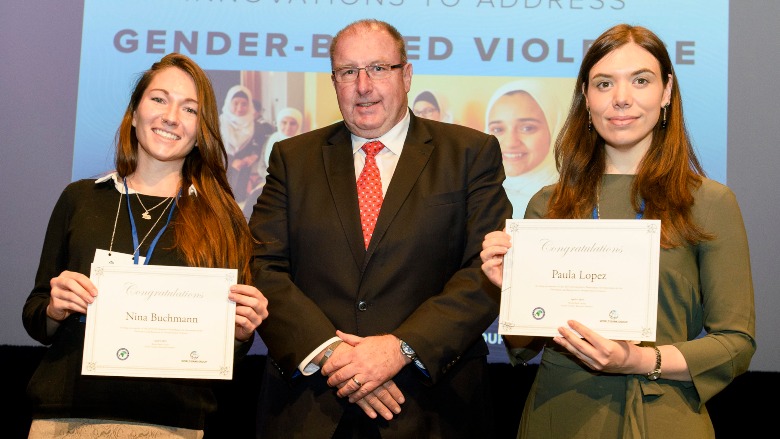A media experiment to reduce intimate partner violence in Bangladesh
 World Bank Vice President for South Asia Hartwig Schafer presents 2019 Development Marketplace award to Nina Buchmann and Paula Lopez, Bangladesh Photo: World Bank / Grant Ellis
World Bank Vice President for South Asia Hartwig Schafer presents 2019 Development Marketplace award to Nina Buchmann and Paula Lopez, Bangladesh Photo: World Bank / Grant Ellis

Project Summary:
The potential of the mass media to shape social norms and spur new behaviors is increasingly being recognized. This project aims to provide experimental evidence on the relative effectiveness of sending messages using public and private transmission channels to change social norms.
The Development Marketplace Award will be used by the researchers to evaluate the impact of a media campaign (using video clips and podcasts) in Dhaka, Bangladesh, designed to reduce the acceptability of intimate partner violence. The researchers will assess its effects on victimization, and on gender attitudes and beliefs. They will examine how these results differ when the intervention is targeted to individual husbands, couples, or to couples and their closest neighbors.
Project Team:
Nina Buchmann is a PhD student in economics at Stanford University. Her areas of interest include development economics and behavioral economics and she is particularly interested in issues related to gender, sexual assault and domestic violence.
Prior to coming to Stanford, Buchmann worked as a research associate at JPAL/the Duke Development Lab and analyzed the impact of a large randomized control trial aiming to reduce child marriage and increase female empowerment in Bangladesh. She also worked as a consultant at the United Nations Conference on Trade and Development and the European Central Bank researching and evaluating the relationship between finance and development.
Buchmann holds a BA in economics from Harvard University and MA in development economics from Yale University.
Paula Lopez-Pena is a postdoctoral fellow with Innovations for Poverty Action and Yale University, and a visiting researcher at the BRAC Institute of Governance and Development. She is affiliated with the Yale Research Initiative on Innovation and Scale (Y-RISE), which seeks to test promising policy interventions and to conduct research on the challenges and implications of scale.
Paula earned her PhD from the University of Warwick and holds an MSc from the London School of Economics and Political Science. She has published a number of articles and toolkits on how to measure risky behaviors among youth, and how to design sexual and reproductive health interventions.
Paula’s recent work includes the evaluation of two skills training programs based on Cognitive Behavioral Therapy for working women in Bangladesh. These projects measure the impact of training on the coping skills, mental health, and economic outcomes of female garment workers and business owners.
Atonu Rabbani is an applied microeconomist with research interests in health, labor and organization economics. Currently, he is working in a number of research projects addressing intra-firm productivity and management issues in the ready-made garment (RMG) sector in Bangladesh. He also works in the public health field to understand how promotion, monitoring, and incentive can motivate better hand hygiene behaviors. Recently, he has also worked on evaluating an employer-based mandatory health security scheme to understand how incentives can alter households’ health-seeking behaviors.
He has a number of papers published in international peer-reviewed journals like Journal of Regional Science, American Economic Review, The Lancet, Annals of Internal Medicine, Journal of Biosocial Science, Health Services Research and Archives of Internal Medicine, among others. Dr. Rabbani is currently an Associate Professor in the Department of Economics at the University of Dhaka and also an Associate Scientist with the BRAC James P Grant School of Public Health at the BRAC University.